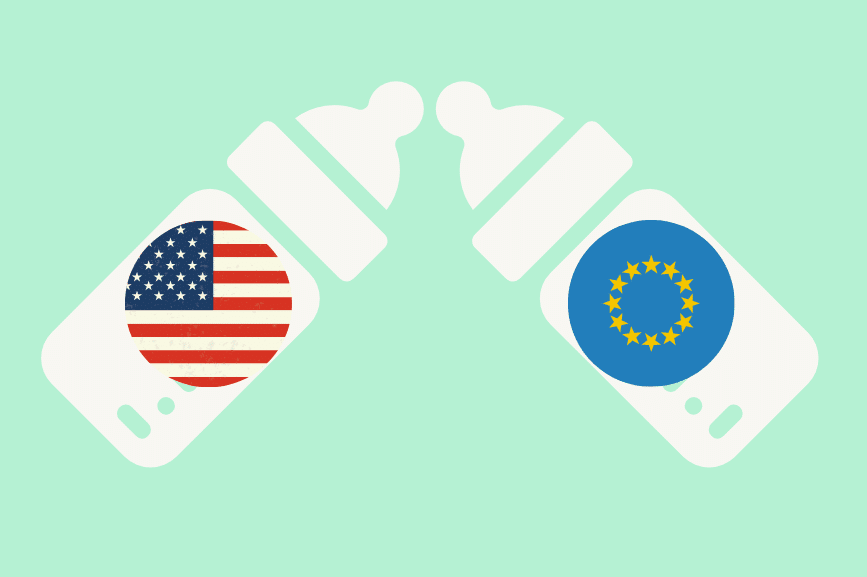We are proud to say that these posts are not sponsored. Our editorial team of Bobbie moms and writers personally select each featured product. If you buy something through our links, we may earn an affiliate commission, at no cost to you.
The European Union is a political and economic union made up of 27 member states. In 2015, the EU updated its infant formula regulations, but they only came to effect this year. They have several key differences compared to the US infant formula regulations.
Requiring DHA/ARA
In the US, most infant formulas contain these healthy fats known mostly for their role in supporting infants developing brains. In the EU, regulations have caught up with the science, requiring these nutrients be contained in EU infant formulas for healthy normal infants. In the US, these nutrients are allowed but not required.
Lowering Iron Levels
Iron is an essential mineral vital for getting oxygen to every call in the body and critical for growth and development of infants. Historically in the US, iron deficiency anemia was a significant public health issue. More recently, research on iron supplementation in infants has shown that more is not better. Noting these findings, the EU has lowered the upper level of allowable iron amounts in infant formula.
Defining the Carbohydrates
In order to both grow properly and support the development of a healthy gut microbiome infants need carbohydrate in their diets. There are many different types of carbohydrates that occur both naturally and can be developed synthetically. The type of carbohydrate found in breastmilk is lactose. The EU regulations recommend lactose as the preferred source of carbohydrate for use in infant formula and list several other types that may be used as well. The US regulations do not have a requirement for this specifically, however, a discussion of which carbohydrate source that is being used must be disclosed to FDA when submitting an infant formula for review.
Focus on Pesticides
The EU regulations have a strong focus on limiting pesticides in food for infants. Understandably so, during this critical time of development, limiting pesticide exposure will undoubtedly improve health. However, due to the ubiquitous and persistent nature of pesticides in the natural environment this poses a significant challenge to farmers and manufacturers choosing to not use pesticides in agricultural products used in infant formulas. The question becomes, how low can we go? Pesticide use is not allowed on products destined for infant formula, however pesticide residues exist in the environment. The EU regulations provide a challenging limit for pesticide residues that works to protect the health of infants yet recognizing the fact that zero is not a realistic goal. In the US, pesticides limits in food are set by the EPA and are not a part of US infant formula requirements specifically.
Rules for Toddler Formulas
Toddler formulas are a relatively new product category and are meant to provide a supplemental source of nutrition during the transition from infant formula to cow’s milk. In the US, these products are regulated as regular foods and there are no requirements for what they need to contain or not contain; in the EU they are part of the infant formula regulations and have nutritional requirements set apart from foods and infant formulas.
Although the evaluation of science and updating regulations is an extremely slow process it is a vital one in order to maintain the health and safety of all infants consuming these products. With the recent updates, the EU is embracing emerging science and updating infant formula requirements accordingly, let’s hope the US FDA follows suit.

